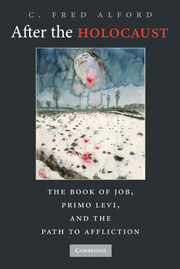3 - Holocaust Testimonies: After the Silence of Job
Published online by Cambridge University Press: 05 June 2012
Summary
Because Job never speaks after his theophany, we never learn if he ever thinks longingly about his first family while in the midst of his second, as some survivors do. Indeed, we never learn for certain whether Job's long life is a blessing or the curse Kierkegaard imagines it was for Abraham. Some survivors present us with a similar question. In some ways, it is the question, at least if we listen to survivors themselves.
A surprising number of witnesses say, in one way or another, implicitly or explicitly, that they “died at Auschwitz.” Charlotte Delbo (1995, 267), a survivor who wrote several memoirs about her experience, said from the outset, “I am not alive. I died in Auschwitz but no one knows it.” What could that mean? Especially for men and women who have gone on to marry (or remarry), raise children for whom they care and evidently love, dote on their grandchildren, and participate in their communities. One hears of this in numerous survivor testimonies.
There are, of course, variants. Max B. said, “I should have died at Auschwitz” (T-1125). Earlier, he said, “plenty of times it wasn't good to survive” (T-94). Several survivors wish they had died with their parents. “We should have died together, me and mother,” said Eva L. (T-71). Martin L. expressed a similar sentiment (T-224). Rather than being a reflection of so-called survivor guilt, doubts about survival raise the very real question of whether the pain of living has been worth the price.
- Type
- Chapter
- Information
- After the HolocaustThe Book of Job, Primo Levi, and the Path to Affliction, pp. 58 - 93Publisher: Cambridge University PressPrint publication year: 2009



